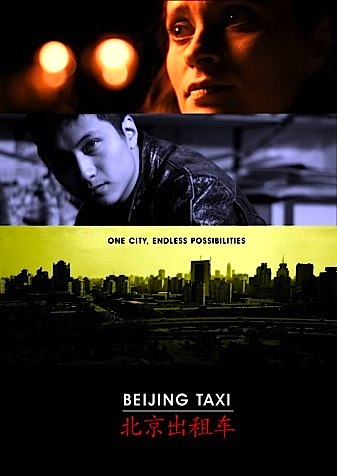By Joe Bendel. It is an open question just how beneficial the 2008 Olympics were to average Chinese citizens. They were a source of pride perhaps, and certainly the well-connected made money through construction contracts and the like. Yet for the city’s working class cabbies, the Olympics – as well as China’s precipitous industrialization – have been a decidedly mixed bag. Indeed, life is not particularly easy for any of the three drivers director Miao Wang unobtrusively follows in Beijing Taxi (trailer above), which opens this Friday at Brooklyn’s reRun Gastropub Theater.
Starting two years prior to the Beijing Games, Taxi documents a city in flux. The games should be a boon to the drivers, what with all the tourists expected. Of course, nothing is so simple in China. Facing new language requirements (ironically, it seems travelers would be more likely to find an English speaking cabbie in Beijing than in New York) and rising costs, Taxi’s subjects are feeling increasingly pinched.
 In various ways, the three cab drivers represent the inherent contradictions of contemporary Chinese society. While critical of China’s go-go economic policies, fifty-four year-old Bai Jiwen also fully recognizes his opportunities are limited because the Cultural Revolution permanently cut short his education. By contrast, thirtysomething Wei Caixia embraces China’s entrepreneurial ethos, but she is not so keen on the hard work part. Perhaps Zhou Yi is the most contented with his lot, but he still tries to maintain links to traditional Chinese culture.
In various ways, the three cab drivers represent the inherent contradictions of contemporary Chinese society. While critical of China’s go-go economic policies, fifty-four year-old Bai Jiwen also fully recognizes his opportunities are limited because the Cultural Revolution permanently cut short his education. By contrast, thirtysomething Wei Caixia embraces China’s entrepreneurial ethos, but she is not so keen on the hard work part. Perhaps Zhou Yi is the most contented with his lot, but he still tries to maintain links to traditional Chinese culture.
Eschewing celebrity narration and talking head interviews, Taxi is not incompatible with the work of China’s so-called “Digital Generation” or “D-Generate” filmmakers. Though in many ways it functions as a critique of China’s comrade capitalism, Taxi is not the gritty, unremittingly depressing cinematic experience one finds in documentaries like Lixin Fan’s Last Train Home. Granted, Taxi’s three central POV figures certainly endure life’s challenges, they nonetheless prove to be quite resilient and even optimistic, at least to an extent.
Their real life dramas are also bookended by a surprisingly cool opening and closing credit sequence, which give the film a bit of panache. Indeed, it is well conceived and executed by the New York based Wang, who immigrated to America in 1990 (one year following the massacre at Tiananmen Square).
Cinematographers Ian Vollmer and Sean Price Williams dramatically capture the pulse and power of Beijing. However, this is a glass and steel urban jungle – which might disappoint viewers hoping to see an ancient and exotic capitol city, much like the underwhelmed tour groups Zhou Yi chauffeurs. Still, the cabbies offer a perfect vantage point for Wang to essentially ask “where are we and how did we get here?” Considerably more accessible for general viewers than one might expect, Taxi is worth a trip out to Brooklyn when it opens at the reRun Gastropub this Friday (12/10).
Posted on December 10th, 2010 at 10:06am.
One thought on “One City, Three Drivers: Beijing Taxi”
Comments are closed.